Are you tired of sneezing, itching, and feeling all stuffed up when allergies strike? Well, guess what? There's a natural way to help you feel better – essential oils!
Imagine if there was something in nature that could make your allergies more bearable, without all those icky side effects from pharmaceuticals. Essential oils are like little drops of goodness from plants that can do just that.
More and more people are turning to natural remedies for allergies because they're gentle on your body and can help you breathe easier. Essential oils have been used for centuries to make people feel better, and now they're gaining popularity again.
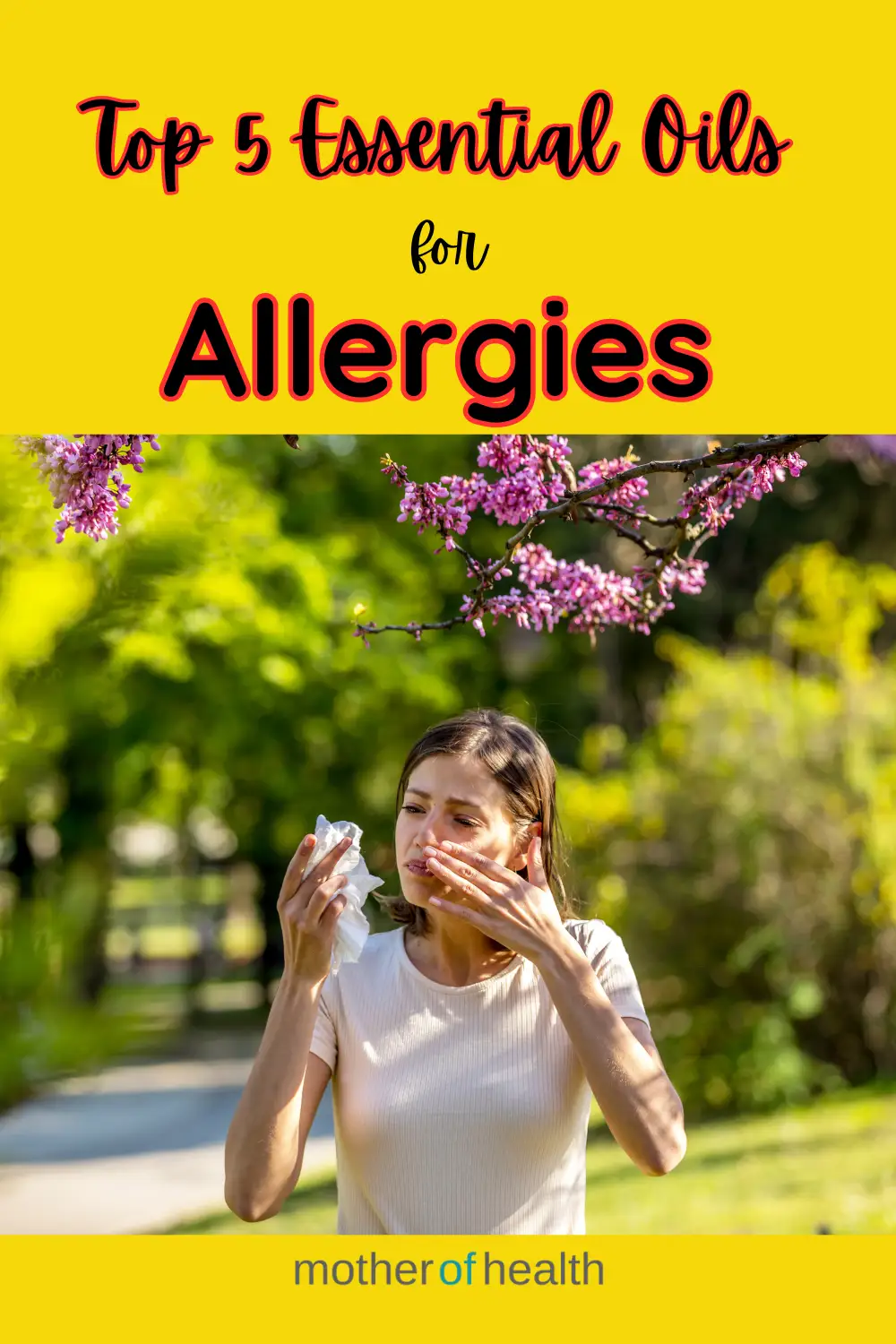

But hold on! Not all essential oils are the same, and that's why it's super important to pick the right ones. Some oils can calm your allergies down, while others might not work well or could even make things worse.
In this article, we're going to talk about five amazing essential oils that can help you fight seasonal allergies and feel more comfortable. We'll explain how they work and give you tips on using them safely. So get ready to discover a natural alternative to your allergic symptoms!
General Symptoms of Seasonal Allergies
Seasonal allergies, also known as hay fever or allergic rhinitis, can manifest with various symptoms. These symptoms typically occur in response to specific allergens like pollen from trees, grasses, and weeds.
Common symptoms include:
- Sneezing
- Runny or Stuffy Nose, sinus pressure
- Itchy skin or Watery Eyes
- Coughing
- Sore Throat
- Fatigue
- Headache
- Ear Congestion
- Loss of Smell or Taste.
- Difficulty Sleeping
- Wheezing or Shortness of Breath
- Dark Circles Under Eyes
- Skin Rashes
- Irritability
- Nasal Polyps
It's important to note that the severity and combination of symptoms can vary from person to person.
The 5 Best Essential Oils For Allergies
These five essential Oils help with Relieving Symptoms of Allergies.
Lemon Essential Oil

Like a burst of sunshine in a tiny bottle, lemon essential oil can work wonders when it comes to easing allergy troubles. It is one of the best essential oils for treating allergies!
Let's dive into how this zesty oil can help you feel better if you are experiencing an allergic reaction.
Properties of Lemon Essential Oil in Alleviating Allergies:
Lemon is famous for its fresh, citrusy scent, and it's packed with properties that can be a big help when allergies strike.
One of the key benefits is its natural antihistamine effect. Histamines are the culprits behind many allergies like sneezing and itching, and lemon oil can help keep them in check.
How Lemon Oil Helps with Congestion and Respiratory Symptoms:
Seasonal allergies often lead to congestion, making it hard to breathe. The essential oil of lemon comes to the rescue with its decongestant powers.
This citrus oil can even treat allergic rhinitis or hay fever successfully. This citrus oil is also useful if you are allergic to dust mites or pet dander.
Just a few drops in a diffuser or a bowl of hot water can work wonders. You'll breathe easier in no time as it clears your stuffy nose and eases that annoying throat tickle.
Different Methods of Using Lemon Oil for Allergy Relief:
Using lemon for your symptoms is a breeze, and there are several ways to do it:
- Diffusion: Add a few drops to an essential oil diffuser, and let the fresh lemony scent fill your space. When diffused, lemon oil can kill bacteria and eliminate allergy triggers in the air. This helps clean the air and soothe your senses.
- Steam Inhalation: Boil some water, pour it into a bowl, and add a few drops. Lean over the bowl with a towel over your head and inhale the steam gently. It's like a spa treatment for your nose!
- Topical Application: Mix a couple of drops with a carrier oil (like almond or coconut oil) and apply it to your chest or throat. Be sure to do a patch check for any skin sensitivities first.
Precautions and Considerations When Using Lemon Oil:
While lemon is a fantastic ally against allergies, there are a few things to keep in mind:
- Sun Sensitivity: Lemon oil can make your skin more sensitive to the sun. So, if you're planning on soaking up some rays, wait a few hours after applying lemon oil topically.
- Quality Matters: Make sure you're using high-quality, pure lemon essential oil. Look for reputable brands to ensure you get the real deal.
Use Essential Oils Wisely
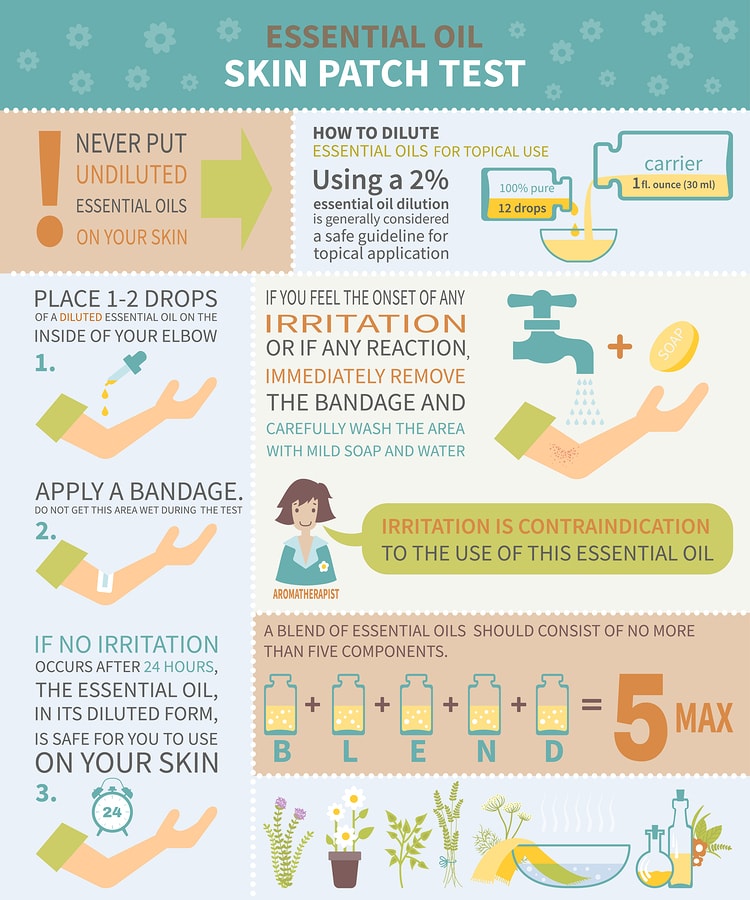
Peppermint Essential Oil
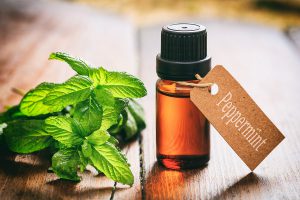
If you're on the hunt for a cool and refreshing way to tackle those pesky allergies, look no further than peppermint essential oil. This minty wonder can be your ally in the fight against symptoms, offering relief in a variety of ways.
Relief from Allergies with Peppermint Essential Oil:
Peppermint essential oil is like a breath of fresh air for allergy sufferers.
It contains compounds like menthol that have potent anti-inflammatory and decongestant properties. These properties can help ease the discomfort caused by allergies and make your life a whole lot more comfortable.
Anti-Inflammatory and Decongestant Properties:
When allergies strike, they often bring along inflammation, making your nose stuffy and your throat scratchy. The essential oil of Peppermint comes to the rescue by reducing inflammation in your airways, helping you breathe more freely. It also has a cooling effect that soothes irritated tissues, providing relief from that itchy feeling.
Various Ways to Use Peppermint Oil for Allergy Symptoms:
The versatility of this oil makes it a fantastic choice for allergy relief.
Here are some effective ways to use it:
Steam Inhalation: Boil some water, pour it into a bowl, and add a few drops of peppermint oil. Cover your head with a towel and inhale the steam gently. This can quickly clear your sinuses and ease congestion.
Diffusion: Use an essential oil diffuser to disperse into the air. The minty aroma can help open up your airways and reduce allergy-related discomfort.
Topical Application: Mix a few drops of peppermint oil with a carrier oil (like almond or jojoba oil) and apply it to your chest or back. Be cautious not to use it directly on your skin, especially if you have sensitive skin, as it can cause a cooling sensation.
Safe and Effective Application:
While peppermint oil can provide relief, it's important to use it safely:
Dilution: Always dilute peppermint oil with a carrier oil before applying it to your skin. The cooling sensation can be intense if applied undiluted.
Patch Test: Before using peppermint oil on a larger area of your skin, do a test to ensure you don't experience any adverse reactions.
Avoid Eye Contact: Be careful not to get peppermint oil near your eyes, as it can cause irritation.
Basil Essential Oil
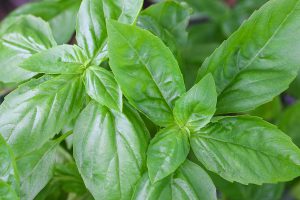
When it comes to soothing allergies naturally, basil essential oil is like a green superhero from your garden. This aromatic oil has a lot to offer anyone who suffers from allergies.
Benefits of Basil Essential Oil for Allergy Sufferers:
Basil essential oil is more than just a flavorful herb in your favorite dishes; it can also be your ally in the fight against allergies.
It contains compounds like linalool and eugenol, which have anti-allergenic and anti-inflammatory effects. These properties make basil oil a valuable tool for managing your symptoms.
Anti-Allergenic and Anti-Inflammatory Properties:
Allergies often trigger a cascade of reactions in the body, including inflammation and immune responses. Basil oil can help calm this storm by reducing inflammation and potentially lessening your body's reaction to allergens. This means less sneezing, itching, and discomfort.
Incorporating Basil Oil into an Allergy Management Routine:
There are several ways to make basil oil a part of your relief strategy:
Aromatherapy: Add a few drops of basil oil to an essential oil diffuser and let the aroma fill your space. Inhaling the scent can help reduce allergy-related congestion and soothe your respiratory system.
Topical Application: Dilute basil oil with coconut or olive oil, and apply it to your chest, throat, or the soles of your feet. This can also promote relaxation.
Steam Inhalation: Boil water, add a few drops of basil oil, and carefully inhale the steam. This method can help clear your nasal passages and ease congestion.
Addressing Potential Contraindications or Side Effects:
While basil essential oil can be beneficial, it's essential to be aware of potential concerns:
Skin Sensitivity: Some people may experience skin sensitivity when using basil oil topically. Always dilute it properly and do a patch test before applying it to a larger area of skin.
Pregnancy and Medical Conditions: If you're pregnant, nursing, or have underlying medical conditions, consult with a healthcare professional before using basil oil, as it may not be suitable for everyone.
Allergies: If you have a known allergy to basil or related plants, it's best to avoid basil oil to prevent any adverse reactions.
Lavender Essential Oil
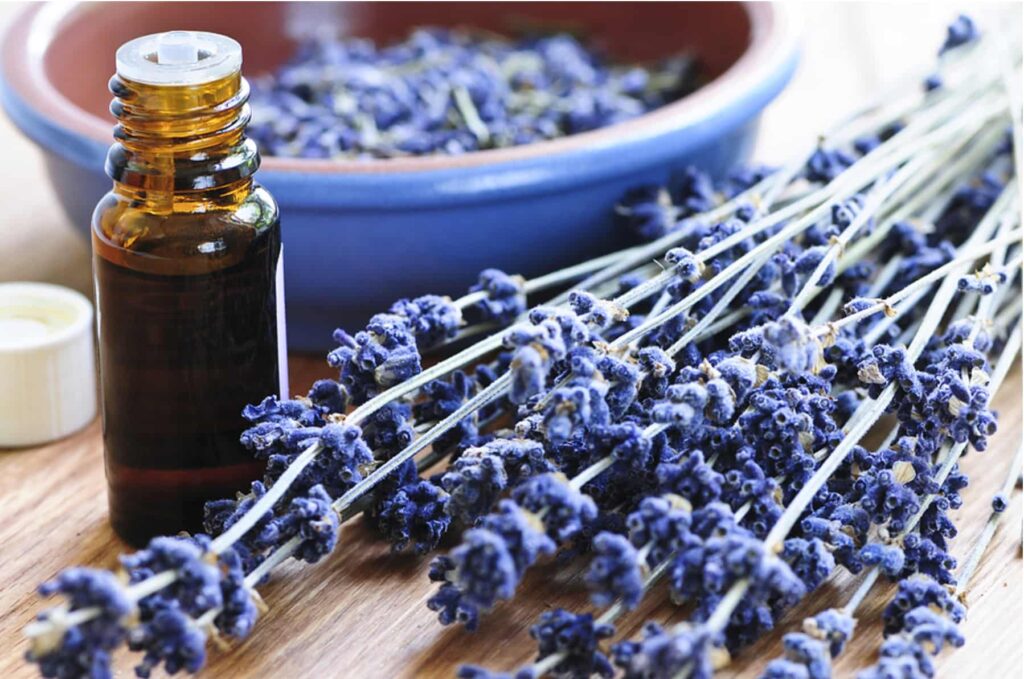
Often associated with relaxation and tranquility, Lavender oil also plays a significant role in managing allergies. This gentle, versatile oil can reduce inflammation and can be a true relief for allergy sufferers.
Lavender Essential Oil's Role in Managing Allergies:
Lavender essential oil is like a calming friend when allergies are causing chaos in your life. It contains compounds like linalool and linalyl acetate that have anti-inflammatory properties. These properties can help reduce the irritation and discomfort caused by allergies.
Soothing and Anti-Inflammatory Qualities:
Allergies can lead to inflamed airways, itchy eyes, and skin irritation. Lavender steps in to soothe these symptoms. Its calming scent can relax your mind and body, while its anti-inflammatory effects work to ease the physical discomfort associated with allergies.
Incorporating Lavender Oil into Allergy Relief Routines:
Lavender offers various ways to bring you relief:
Aromatherapy: Place a few drops in an essential oil diffuser and let the gentle aroma fill your living space. This can promote relaxation and help reduce stress, which can exacerbate allergy symptoms.
Topical Application: Dilute lavender with a carrier, such as almond or jojoba oil, and apply it to your temples, chest, or the back of your neck. This can help calm allergy-related headaches or soothe irritated skin.
Bath Soak: Add a few drops to a warm bath and enjoy a relaxing soak. This not only helps ease your symptoms but also provides a moment of tranquility during allergy season.
Safety Tips and Considerations for Usage:
Using lavender oil safely is essential for reaping its benefits:
Dilution: Always dilute with a carrier oil before applying it to your skin. Undiluted essential oils can cause skin irritation.
Patch Test: Test to ensure you don't have any adverse reactions.
Pregnancy and Children: While lavender oil is generally considered safe for most people, pregnant women and young children should consult with a healthcare professional before using it.
Quality Matters: Choose a high-quality, pure lavender essential oil from a reputable brand to ensure you're getting the real deal.
Lavender essential oil's soothing and anti-inflammatory qualities can be a breath of fresh air during allergy season. By incorporating it into your routine thoughtfully and safely, you can experience the calming effects and find relief from the discomfort allergies often bring.
Eucalyptus Essential Oil

Let's explore how this invigorating oil can be a powerful tool in your allergy symptom relief arsenal.
Eucalyptus Essential Oil as a Powerful Ally Against Allergies:
Eucalyptus essential oil is well-known for its decongestant and anti-inflammatory effects, making it a fantastic choice for tackling allergy symptoms head-on. It opens up your sinuses and lungs, therefore improving circulation, which reduces the symptoms of allergies.
Decongestant and Anti-Inflammatory Effects:
When allergies strike, your nose may become congested, and your airways inflamed.
Eucalyptus comes to the rescue by clearing congestion and reducing inflammation. It contains a compound called cineole, which is known for its decongestant properties.
Utilizing Eucalyptus for Allergy Symptom Relief:
There are various ways to make eucalyptus a part of your routine:
- Steam Inhalation: Boil a pot of water, remove it from heat, and add a few drops of this oil. Lean over the pot with a towel over your head and inhale the steam gently. This method can provide quick relief from congestion and soothe your irritated airways.
- Diffusion: Use an essential oil diffuser to disperse eucalyptus oil into the air. Breathing in the eucalyptus-scented mist can help open up your air passages and reduce allergy-related discomfort.
- Topical Application: Dilute with carrier oils (like coconut or olive oil) and apply it to your chest or back. Be cautious not to use it directly on your skin, especially if you have sensitive skin, as it can be quite potent.
Caution About Potential Sensitivities and Usage Limitations:
While eucalyptus oil can be incredibly effective, it's vital to use it with care:
- Dilution: Always dilute with a carrier before applying it to your skin. Undiluted can be too strong and cause skin irritation.
- Patch Test: Before applying eucalyptus to a larger area of your skin, test to ensure you don't have any adverse reactions.
- Children and Pets: Eucalyptus oil should be kept out of reach of children and pets, as it can be toxic if ingested.
- Respiratory Conditions: If you have a respiratory condition such as asthma, consult with a healthcare professional before using eucalyptus oil, as it can potentially exacerbate symptoms in some cases.
Eucalyptus essential oil is a potent weapon against allergies, thanks to its decongestant and anti-inflammatory effects.
By incorporating it into your allergy relief routine while being mindful of sensitivities and usage limitations, you can harness the power of this invigorating oil to breathe easier and find relief from allergy symptoms.
Before You Go
In the quest for natural allergy remedies, we've explored the incredible potential of five essential oils:
- Lemon
- Peppermint
- Basil
- Lavender
- Eucalyptus.
These aromatic allies each bring their unique strengths to the table, from anti-allergenic and anti-inflammatory properties to decongestant and soothing effects.
However, it's crucial to remember that not all essential oils are created equal. Choosing the right one for your individual needs is key.
While lemon oil may be your go-to for its antihistamine effects, peppermint could work wonders for clearing congestion. Basil, with its anti-allergenic properties, offers another excellent option, while the calming Lavender and invigorating Eucalyptus oils have their roles to play.
But before you embark on your essential oil journey, learn about the essential oils you plant to use.
In closing, these 5 best essential oils for allergies hold incredible promise as natural allies.
With the right choice and careful guidance, you can harness their power to breathe easier, find comfort, and experience the relief you deserve during allergy season.
Nature's remedies are waiting to soothe your symptoms gently.
Related Content:
Ayurvedic Essential Oils for Each Body Type
Best Essential Oils for a Cold




I think I’ve had some kind of inflammation in my body for many years now. I always wake up in the morning with itchy and stuffy nose, I sneeze a dozen times and blow my nose before I get up. This happens a lot and I use OTC medicine and it doesn’t work well. I’ve always been a fan of lavender so maybe I’ll give lavender oil a try… better than pills if it works.
Hi Kent, Also, look to improve your digestion – https://motherofhealth.com/improve-digestion
Here’s another post on Natural Remedies and habits for a sinus health https://motherofhealth.com/natural-remedies-sinus-…
Let me know if I can help. Thanks for connecting! 🙂
I was very interested in your article on essential oils and had not realized the benefits that can be had by using them. Using natural remedies is much better than running to the doctor for antibiotics and I will definitely try your suggestions next time my allergies play up. I am just wondering is it possible to have an allergic reaction to some essential oils?
Thanks for asking Margaret… Allergic reactions to essential oils is rare, but possible. Essential oils do not have proteins and amino acids, which can trigger an allergic/immune system response, but they do have smaller molecules that can bind to proteins in the body. When they bind, it can initiate an immune response and cause an allergic reaction. It’s recommended to do a skin patch test prior to the use of any new essential oil to rule out the possibility. I hope this helps.
I really enjoyed looking at your website. I suffer from seasonal allergies and I am definitely going to try the peppermint and lavender oil. I had no idea how beneficial it is to use essential oils. Your website gives a lot of good information. Have you ever tried these methods? If so, does it work well?
Hi Kassandra,
Thanks for connecting and browsing the site! 🙂 So happy you’re going to try essential oils. Yes, I use them all the time for practically everything! Let me know if I can help you ever.
Take good care,
Jackie
The essential oil can also help to ease allergies like this peppermint which is a good essential oil to start with when you want to ease your allergy symptoms is peppermint. It is also great when you are already experiencing your allergy symptoms. Glad to know this.